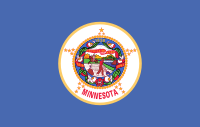Portal:Minnesota
The Minnesota Portal Minnesota (/ˌmɪnəˈsoʊtə/ MIN-ə-SOH-tə) is a state in the Upper Midwestern region of the United States. It is bordered by the Canadian provinces of Manitoba and Ontario to the north and east and by the U.S. states of Wisconsin to the east, Iowa to the south, and North Dakota and South Dakota to the west. It is the 12th-largest U.S. state in area and the 22nd-most populous, with about 5.75 million residents. Minnesota is known as the "Land of 10,000 Lakes" and has 14,420 bodies of fresh water covering at least ten acres each. Roughly a third of the state is forested. Much of the remainder is prairie and farmland. More than 60% of Minnesotans, about 3.8 million, live in the Minneapolis–Saint Paul metropolitan area, known as the "Twin Cities", the state's main political, economic, and cultural hub and the 16th-largest metropolitan area in the U.S. Other minor metropolitan and micropolitan statistical areas include Duluth, Mankato, Moorhead, Rochester, and St. Cloud. Minnesota, which gets its name from the Dakota language, has been inhabited by various Native Americans since the Woodland period of the 11th century BC. Between roughly 200 and 500 AD, two areas of the indigenous Hopewell tradition emerged: the Laurel complex in the north, and Trempealeau Hopewell in the Mississippi River Valley in the south. The Upper Mississippian culture, consisting of the Oneota people and other Siouan speakers, emerged around 1000 AD and lasted through the arrival of Europeans in the 17th century. French explorers and missionaries were the earliest Europeans to enter the region, encountering the Dakota, Ojibwe, and various Anishinaabe tribes. Much of what is now Minnesota formed part of the vast French holding of Louisiana, which the United States purchased in 1803. After several territorial reorganizations, the Minnesota Territory was admitted to the Union as the 32nd state in 1858. Minnesota's official motto, L'Étoile du Nord ("The Star of the North") is the only state motto in French. This phrase was adopted shortly after statehood and reflects both the state's early French explorers and its position as the northernmost state in the contiguous U.S. As part of the American frontier, Minnesota attracted settlers and homesteaders from across the country. Its growth was initially based on timber, agriculture, and railroad construction. Into the early 20th century, European immigrants arrived in significant numbers, particularly from Scandinavia, Germany, and Central Europe. Many were linked to the failed revolutions of 1848, which partly influenced the state's development as a center of labor and social activism. Minnesota's rapid industrialization and urbanization precipitated major social, economic, and political changes in the late 19th and early 20th centuries; the state was at the forefront of labor rights, women's suffrage, and political reform. Consequently, Minnesota is unique among Midwestern states in being a relative stronghold of the Democratic Party, having voted for every Democratic presidential nominee since 1976, longer than any other U.S. state. (Full article...) Entries here consist of Good and Featured articles, which meet a core set of high editorial standards.
Lorena Alice "Hick" Hickok (March 7, 1893 – May 1, 1968) was an American journalist and long-term friend and possibly romantic partner of First Lady Eleanor Roosevelt. After an unhappy and unsettled childhood, Hickok found success as a reporter for the Minneapolis Tribune and the Associated Press (AP), becoming America's best-known female reporter by 1932. After covering Franklin D. Roosevelt's first presidential campaign, Hickok struck up a close relationship with the soon-to-be First Lady, and travelled with her extensively. The nature of their relationship has been widely debated, especially after 3000 of their mutual letters were discovered, confirming some level of physical intimacy. Hickok was known to be a lesbian. The closeness of their relationship compromised Hickok's objectivity, leading her to resign from the AP and work as chief investigator for the Federal Emergency Relief Administration (FERA). She later promoted the 1939 New York World's Fair, and then served as executive secretary of the Women's Division of the Democratic National Committee, living mostly at the White House, where Hickok had a conjoining room with the First Lady. Hickok was the author of several books. (Full article...) Selected article - The University of Minnesota Twin Cities (historically known as University of Minnesota) is a public land-grant research university in the Twin Cities of Minneapolis and Saint Paul, Minnesota, United States. The Twin Cities campus comprises locations in Minneapolis and Falcon Heights, a suburb of St. Paul, approximately 3 mi (4.8 km) apart. The Twin Cities campus is the oldest and largest in the University of Minnesota system and has the ninth-largest (as of the 2022–2023 academic year) main campus student body in the United States, with 54,890 students at the start of the 2023–24 academic year. It is the flagship institution of the University of Minnesota System and is organized into 19 colleges, schools, and other major academic units. (Full article...) General images -The following are images from various Minnesota-related articles on Wikipedia.
Did you know -
Related portalsTopicsLargest cities
CategoriesNew articlesThis list was generated from these rules. Questions and feedback are always welcome! The search is being run daily with the most recent ~14 days of results. Note: Some articles may not be relevant to this project.
Rules | Match log | Results page (for watching) | Last updated: 2024-10-31 21:14 (UTC) Note: The list display can now be customized by each user. See List display personalization for details.
WikiProjectsTasks
Associated WikimediaThe following Wikimedia Foundation sister projects provide more on this subject:
Sources
Discover Wikipedia using portals |














































